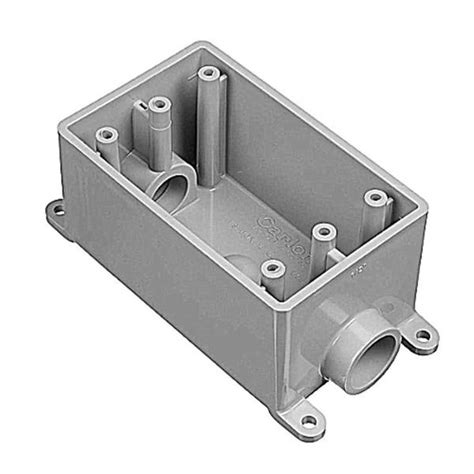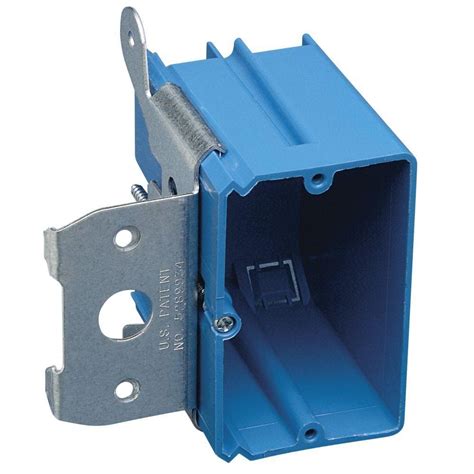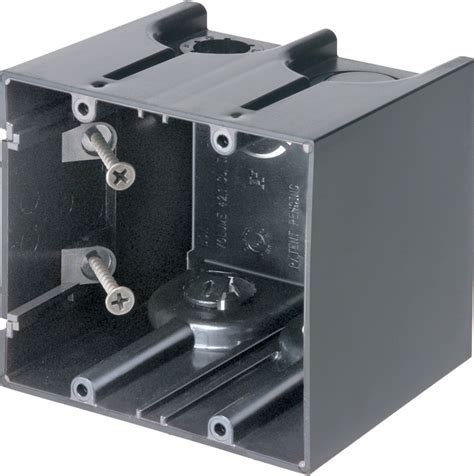metallic vs non metallic junction box Metal junction boxes always need to be grounded, whether you're using NM (non-metallic) plastic-sheathed cable or metallic cable. Metallic cable is self-grounding, as long as the cable is properly secured to the box. NM cables are not self-grounding. MIG is one of the best ways to weld 20-gauge sheet metal. MIG welding is one of the simplest to use for welding. It is an arc welding process that where you feed a solid wire electrode through a welding gun. Metal inert gas is then used to protect the weld from contaminants.Stick welding sheet metal can be done by welding DC electrode negative with 20-40A which is about the the lowest amperage settings that still allows to strike an arc. Suitable electrodes are E6011 for rusty or painted .
0 · single gang non metallic box
1 · nonmetallic electrical boxes
2 · non metallic outlet boxes
3 · non metallic boxes electrical
4 · electrical non metallic junction boxes
5 · carlon pvc outlet boxes
6 · carlon boxes catalog
7 · carlon 24x24x6 pvc box
First, you need a suitable TIG welder for the job. The right TIG welding machine for copper should have a higher welding current than the one for steel due to the thermal properties of copper. You will also need a tungsten electrode, usually made from either pure tungsten or thoriated tungsten.
Metal junction boxes always need to be grounded, whether you're using NM (non-metallic) plastic-sheathed cable or metallic cable. Metallic cable is self-grounding, as long as the cable is properly secured to the box. NM cables are not self-grounding.NM wire: NM (non-metallic) wire is electrical wire with an outermost sheathing made .BX cable is required when a metal box must be grounded to the cable's .To install this type of clamp, insert the threaded end into a knockout hole in the .
Consider the type of electrical cable you are using, too. If the project calls for non . Plastic new work boxes are commonly used with non-metallic cable wiring. They offer quick installation and are good for most residential . In use for far longer than PVC versions, metal electrical boxes are super-strong, fireproof, and incapable of melting. They offer the greatest level of security for electrical wiring applications. It's also virtually impossible to crush . Metal Junction Box: Metal junction boxes are more long-lasting as they have high melting points ( from 660°C to 1,538°C ) and are stronger than plastic boxes so, they can be used long-term. Plastic junction boxes are not so .
Metallic enclosures are strong and durable, offering excellent protection in tough environments. Non-metallic enclosures are lightweight and resistant to corrosion. They are . When you shop for different options, you’ll find that most enclosures fall into two categories: metallic and non-metallic. Which should you choose? It depends on the . Junction box enclosures can be made either of metal (usually aluminum or stainless steel) or plastic (usually polycarbonate or ABS). Choosing between plastic and metallic junction boxes is one of the first big decision .
Metal junction boxes offer durability and grounding capabilities, making them suitable for outdoor and industrial applications. Plastic junction boxes are lightweight and . Metal junction boxes always need to be grounded, whether you're using NM (non-metallic) plastic-sheathed cable or metallic cable. Metallic cable is self-grounding, as long as the cable is properly secured to the box. NM cables are not self-grounding. There are two types of junction boxes in common use today: metal junction boxes and plastic junction boxes. Both have their own advantages, and both are useful for certain applications. For many applications, the biggest advantage of a metal junction box is its durability.
Consider the type of electrical cable you are using, too. If the project calls for non-metallic cable, such as Type NM-B (non-metallic sheathed cable), you can use plastic boxes or metal boxes. If you are installing wires enclosed in metal conduit, you must use a metal box. Plastic new work boxes are commonly used with non-metallic cable wiring. They offer quick installation and are good for most residential applications. Metal new work boxes are preferred when using metal-clad cables. These provide better grounding and bonding capabilities. In use for far longer than PVC versions, metal electrical boxes are super-strong, fireproof, and incapable of melting. They offer the greatest level of security for electrical wiring applications. It's also virtually impossible to crush or bend a metal junction box! Metal Junction Box: Metal junction boxes are more long-lasting as they have high melting points ( from 660°C to 1,538°C ) and are stronger than plastic boxes so, they can be used long-term. Plastic junction boxes are not so sturdy, so not suitable for outside areas.

single gang non metallic box
Metallic enclosures are strong and durable, offering excellent protection in tough environments. Non-metallic enclosures are lightweight and resistant to corrosion. They are often the better choice for outdoor or wireless applications. In this article, we’ll explain the differences, helping you choose the proper enclosure for your project. When you shop for different options, you’ll find that most enclosures fall into two categories: metallic and non-metallic. Which should you choose? It depends on the applications, but a quick look at the pros and cons of each can help you decide. Junction box enclosures can be made either of metal (usually aluminum or stainless steel) or plastic (usually polycarbonate or ABS). Choosing between plastic and metallic junction boxes is one of the first big decision points when specifying an enclosure type for a commercial application.


sheet metal fabrication west virginia

nonmetallic electrical boxes
Versatile Fabrication has one of the largest fabrication facilities in West Michigan. This means that no job is too large or too complex for our consideration. Simply put, we’ve been living up to our name for 50 years!
metallic vs non metallic junction box|nonmetallic electrical boxes